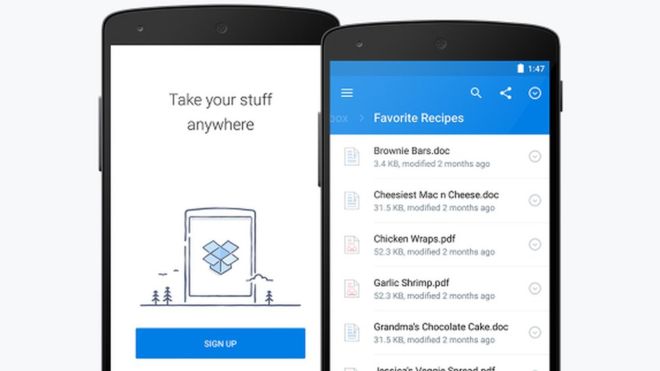
“A Dropbox security breach in 2012 has affected more than 68 million account holders, according to security experts.
Last week, Dropbox reset all passwords that had remained unchanged since mid-2012 “as a preventive measure”.
In 2012, Dropbox had said hacks on “other websites” had affected customers who used their Dropbox password on other sites too.
But now what purports to be the details of 68.6 million Dropbox accounts have emerged on hacker trading sites.
The 5GB document has been acquired by a Motherboard reporter, who also said it had been verified as genuine by a “senior Dropbox employee” speaking on the condition of anonymity.
The data includes email addresses and hashed passwords.
But security researcher Troy Hunt, who has also seen the document, said the hashing algorithm that obscured the passwords was “very resilient to cracking”.
“Frankly, all but the worst possible password choices are going to remain secure even with the breach now out in the public,” he said.
Mr Hunt said he had managed to independently verify the hack by finding the password of his wife within the cache.
He told BBC News the document contained a “very unique, 20-character, completely random password” used by his wife to login to Dropbox.
It had been created by a password manager, he said, making the chance of it having been correctly guessed “infinitely small”.
Mr Hunt wrote his blog: “There is no doubt whatsoever that the data breach contains legitimate Dropbox passwords – you simply can’t fabricate this sort of thing.”
Security researcher Ken Munro also said the hack appeared to be genuine and to have “taken place in 2012”.
In a statement sent to the BBC, Dropbox said: “This is not a new security incident.”
And there was “no indication” Dropbox user accounts had been improperly accessed.
“Our analysis confirms that the credentials are user email addresses with hashed and salted passwords that were obtained prior to mid-2012,” said the statement.
“We can confirm that the scope of the password reset we completed last week did protect all impacted users.
“Even if these passwords are cracked, the password reset means they can’t be used to access Dropbox accounts.”
Meanwhile, on Tuesday the password management service OneLogin – of which Dropbox is a client – revealed that a user gained access to one of its systems used for log storage and analytics.
Alvaro Hoyos, chief information security officer at OneLogin, has said that this incident is not connected to the Dropbox hack.
“We have no indication that OneLogin’s August 2016 incident is connected to any further incidents currently in the news,” Mr Hoyos told the BBC.
“To reiterate what our recent blog post stated, the impacted system is a standalone system and there are no signs of suspicious activity in any of our other systems.
“The security of our customers is of the utmost importance and we are carrying out an extensive investigation in partnership with a third-party cybersecurity firm. We are advising impacted customers as soon as any additional information becomes available as a result of the investigation.””
